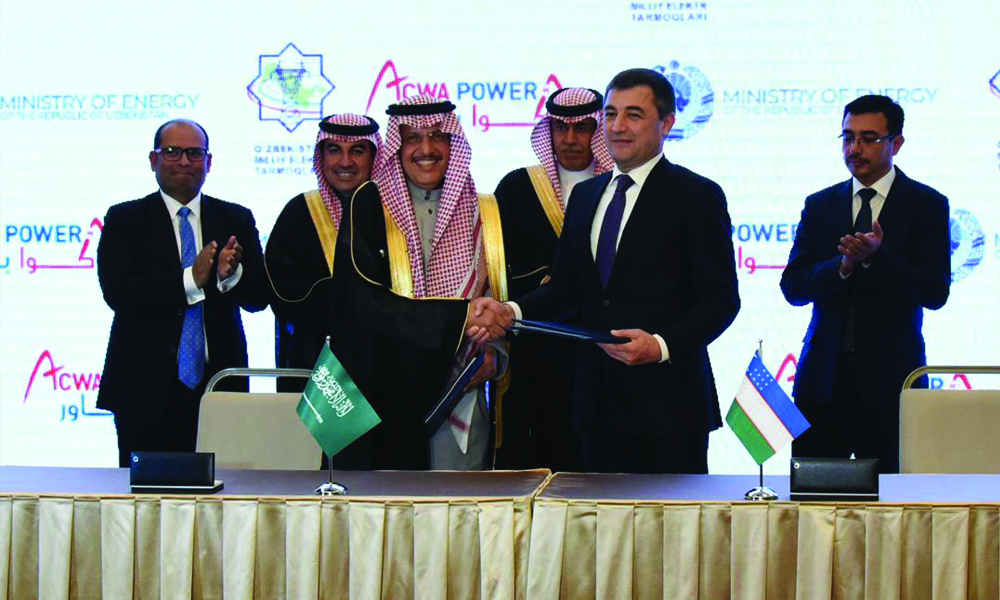Saudi Arabia’s ACWA Power has announced that it has signed three new strategic agreements with the Ministry of Energy of Uzbekistan to amplify power generation and develop technical expertise. The agreements could potentially be worth up to $2.5 billion.
According to a statement from ACWA Power, the agreements include a 25 year Power Purchase Agreement (PPA) – with a total investment value of $1.2 billion – for a 1500 MW Combined Cycle Gas-Turbine (CCGT) power plant; an Implementation Agreement worth $550 million-$1.1 billion for the building of a wind power plant with a capacity of 500-1000 MW of clean energy; and a Memorandum of Understanding (MOU) for the development of a training centre to enhance technical skills of Uzbek students and professionals.
Under the terms of the agreement, ACWA Power will take the lead in construction, engineering, operation and maintenance of the 1500 MW CCGT power plant. It will contribute to Uzbekistan’s fast track ambitious plan to attract foreign direct investment in essential key sectors and the implementation of its energy diversification strategy, ACWA Power stated. JSC National Electric Grids of Uzbekistan will be the sole off-taker for the project.
The CCGT plant’s efficiency rate will be in excess of 60 perc cent – saving almost twice the natural gas currently used for electricity production. The Investment Agreement for this project is signed with the Ministry of Investment and Foreign Trade, the Saudi utility firm added.
The second agreement will utilise Uzbekistan’s natural renewable energy sources while the agreement envisages the development, financing, construction, operation and maintenance of the 500-1000 MW wind farm.
ACWA Power stated that the third agreement is an MoU between the Ministry of Energy of Uzbekistan, Air Products & Chemicals and ACWA Power. It entails training programs to bolster the technical expertise of students and professionals at one or more colleges in Uzbekistan and will equip potential talent with the tools and knowledge to gradually support a local supply chain for the utilities and chemicals sectors in Uzbekistan.
Mohammad Abunayyan, chairman of ACWA Power, said: “With our relentless pursuit to align with the pillars of the Saudi Vision 2030 and contribute effectively to achieving its aspirations and goals, we are moving forward on our path of global growth through expanding our geographical footprint and presence in the central Asia. The market in this part of the world is thriving with economic activity that will stimulate private sector investment and participation in the energy sector”.
“With our proven track record as a global leader in the sectors of power generation and water desalination, with in-depth knowledge and expertise, we are proud to have been granted this opportunity to build strategic partnerships with the Uzbek government.”
Alisher Sultanov, Minister of Energy of Uzbekistan said: “These newly agreed power projects represent a historic milestone for Uzbekistan and support our mission to strengthen energy security through self-sufficient power sources. ACWA Power’s focus on smart, energy efficient technologies will provide more than 2000 MW of added power and enable us to achieve a more sustainable, secure and affordable energy ecosystem for our country.”
“Our partnership will deepen the friendly economic relations between the Kingdom of Saudi Arabia and the Republic of Uzbekistan, and will allow us to utilize our capabilities to unlock the tremendous growth potential of the energy sector in Uzbekistan,” Abunayyan said, adding that the project will be located in Shirin City in the Sirdarya region and will be developed as a ‘Build, Own, Operate, Transfer’ project.
Additionally, he noted that the signing of the three agreements with the Uzbek government highlights the pivotal role of the Saudi private sector in the Saudi economy and in fortifying the base of Saudi investments abroad as well as fruitful economic relations between Saudi Arabia and friendly countries.
“The agreements inked with the Uzbek government will contribute to creating job opportunities, developing community and achieving a sustainable future for the country,” concluded Abunayyan.

